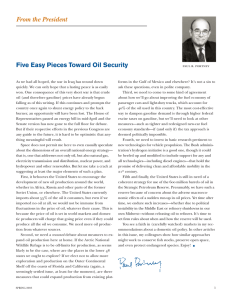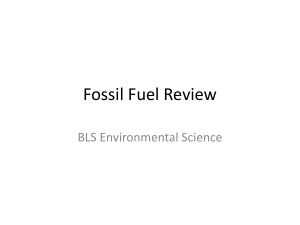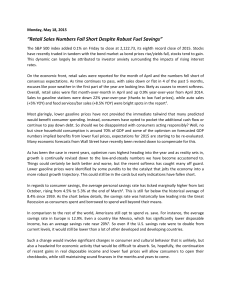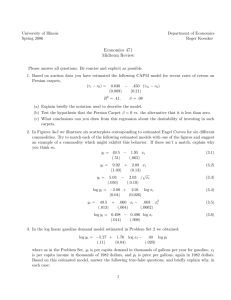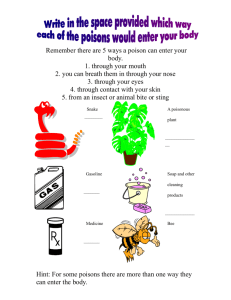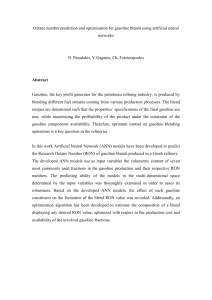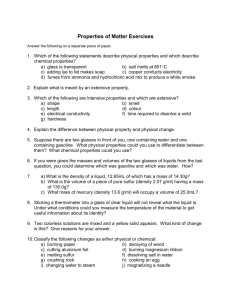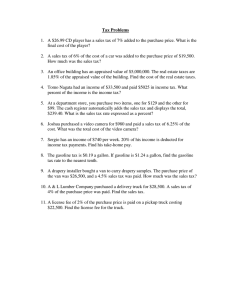Evolution of the High Volume Gasoline Retailer for Woods & Partners Prepared
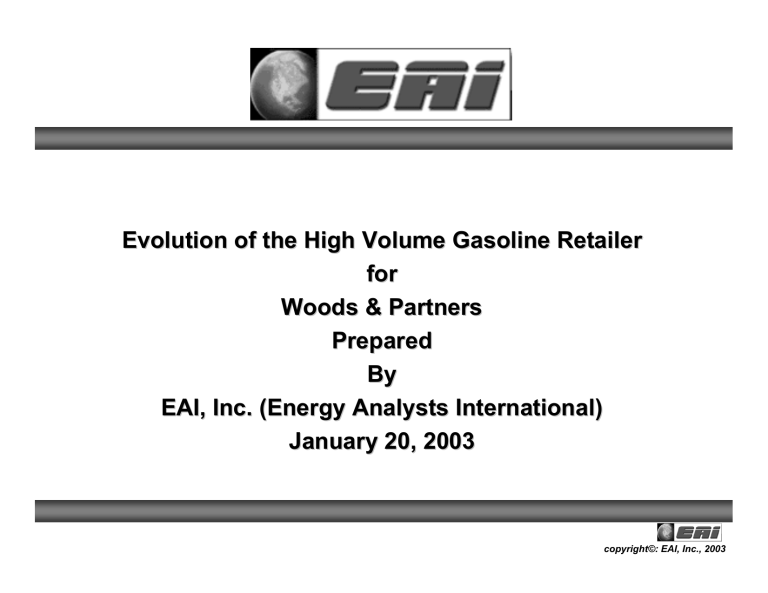
copyright©: EAI, Inc., 2003
q This document was prepared for Woods & Partners to provide insights into the evolution of the retail gasoline business with specific focus on the emergence of the High Volume Retailer (HVR) operations q HVR operations represent very large and efficient sites that generally have gasoline sales that are on the order of two to three times the level achieved by conventional retail gasoline operations. Some of the HVR locations may have gasoline sales levels that are 8 to 10 times that of conventional retail gasoline sites q This trend has been occurring in the United States over the last five to eight years with acceleration of this phenomena over the last three years q Although somewhat lagged, the Canadian retail market is experiencing a number of the same changes that have been taking place in the United States q The high gasoline throughput levels can result in a much lower operating cost level in terms of unit costs (cost per unit of gasoline sales)
1 copyright©: EAI, Inc., 2003
2
Evolution of Gasoline Retail
Operations
Hypermarts
With Gasoline
Independent
High Volume
Retailers
Convenience
Stores with
Gasoline
Self Server
Pumper Units
Attendant
Server-Gasoline
Only copyright©: EAI, Inc., 2003
q Gasoline Pumper Unit : Older style gasoline retail facility for which the business is largely from gasoline sales.
Sites generally have an attendant booth that may or may not serve as a kiosk (limited sales of select snacks, beverages and cigarettes). Unit sales are generally limited by site size and MPD availability. q Conventional Gasoline-Convenience Store Operation :
These sites offer both a small convenience store in addition to gasoline retail facilities. Generally the sites have four to six MPD units and the convenience store size is in the range of 2000 to 3000 square feet (or smaller).
3 copyright©: EAI, Inc., 2003
q High Volume Retailer : There are two primary business categories comprising this basic business model:
1) Independent HVR’s: Independent convenience store-gasoline operation with the convenience store size in the range of 3000 to 5000 square feet
(or larger) and having 8 to 12 MPD units.
2) Hypermart HVR’s: Gasoline and, in some cases, convenience store operations that are located within the parking lot of a big box retailer.
Ø The Mass Merchandiser (MM) category is a subset of the overall hypermart HVR Category. BJ’s, Sam’s Club and Costco are the largest mass merchandisers in North America.
Ø The MM HVR’s generally have a “no frills” - “gasoline only” operation that focus on high volume and competitive pricing.
Ø The MM HVR’s tend to locate in high density-urban market areas.
4 copyright©: EAI, Inc., 2003
q
The number of hypermart HVR gasoline operations in the United States has increased from 1,140 in year 2000 to approximately 2,434 locations as of October, 2002.
q In addition, there are approximately 2,000 Independent High Volume Retailers in the
United States (only considering the dominant companies consisting of Sheetz,
QuikTrip, WaWa and RaceTrac). Thus, the total number of HVR sites in the United
States is approximately 4411. q In contrast, the total number of retail outlets in the United States in 2002 is approximately 170,700 locations.
q EAI is forecasting the total number of hypermart HVR sites to increase from 2,434 in
2002 to somewhere between 6000 and 7000 sites by 2007.
q This increase in sites will result in the hypermart HVR business increasing their market share from 5.8 percent in 2002 to a range of 12 to 16 percent by 2007 q Hypermarts are advancing into the gasoline retail business in Canada. Loblaws,
Safeway, Costco and Wal-Mart (with Murphy Oil) are all expanding gasoline retail operations in Canada
5 copyright©: EAI, Inc., 2003
6
Hypermart Gasoline Sales Volume Outlook
40
30
20
10
0
100
90
80
70
60
50
2002 2003 2004 2005 2006 2007
Year
Base Volume Speculative Vlm
Base Volume-Accounts for companies currently having gasoline retail
Speculative Volume-account for companies not currently involved in gasoline retailing copyright©: EAI, Inc., 2003
Hypermart Gasoline Sales Volume Outlook
20.00%
15.00%
10.00%
5.00%
7
0.00%
2002 2003 2004 2005 2006 2007
Year
Base Volume Speculative Vlm
Base Volume-Accounts for companies currently having gasoline retail
Speculative Volume-account for companies not currently involved in gasoline retailing copyright©: EAI, Inc., 2003
q The Dallas/Ft. Worth area is one of the most advanced hypermart fuel retail markets in the U.S. and serves as a glimpse of the future although not all markets will track DFW.
q Since early 2001, hypermart gasoline sites have increased from 72 to 128 locations as of September, 2002. This represents a gasoline market share in the range of 13 to 15 percent. q In addition to the hypermarts, the independent HVR operations have grown in the Dallas/Ft. Worth market.
q With hypermarts competing with each other and the presence of large independent retailers, gasoline margins have been kept low to support the strategy of high volume and low price.
8 copyright©: EAI, Inc., 2003
q The gasoline sales for a hypermart HVR site average between 945 and 1,323) thousand liters per month (250 - 350 mgal/month). Some of the larger mass merchandise retail locations can have gasoline sales volume in the range of
1,134) to 2,646 thousand liters per month (300 - 700 mgal/month).
q In contrast, the average gasoline sales for the U.S. convenience store industry, in 2001, was approximately 415.8 thousand liters(110 mgal) per month according the National Association of Convenience Stores (NACS). q The high throughput levels achieved by the hypermart HVR sites is accomplished by having a relatively large site accommodating higher volumes and therefore supporting lower prices typically in the range of 3 to 10 cents per gallon less than the local competition.
q A number of the hypermarts, especially the mass merchandisers, operate with a business model philosophy of high volume, low price and lower unit costs.
9 copyright©: EAI, Inc., 2003
10
HYPERMART GASOLINE SITES & VOLUME ESTIMATES
U.S. MARKET; OCTOBER 2002
Currently 2,434 fuel sites and 5.8 % of market
ESTIMATED
SALES PER
MARKET
CHANNEL
NUMBER OF
SITES
SITE
VOLUME ESTIMATE
(MM Liters)
(000 Liters per Month)
SUPERMARKETS
1,270 835 12,745
DISCOUNT
STORES
MASS
MERCHANDISE
U.S. TOTAL
636
528
767
1,912
6,000
12,120
2,434 1,050 30,675 copyright©: EAI, Inc., 2003
11
Nearly 40 % of convenience customers will shift gas sources for 3 cpg
95.0%
85.0%
75.0%
65.0%
55.0%
45.0%
35.0%
25.0%
15.0%
1.5
3 4.5
6.5
8
HYPERMART 18.20% 33.10% 61.50% 74.30% 100.00%
CONVENIENCE 17.00% 39.70% 68.10% 78.00% 100.00%
Lines on chart represent cumulative percent of customers copyright©: EAI, Inc., 2003
q Examination of trends in rack to retail margins for major U.S. metropolitan areas over the 2000 - 2002 timeframe indicate a general decline in retail margins.
q This decline in retail margins is observed to be greater in metropolitan areas with higher penetration of high volume retailers (HVR or hypermarts).
q As observed for metro areas with small to moderate HVR penetration, the average rack to retail margin was 11 - 22 cents per gallon. In metro areas with high HVR penetration, the margin was 5 - 9 cents per gallon.
q Although the decline of gasoline margins is influenced by a variety of factors, the advancement of the HVR business model, with its lower price-higher volume position, has played a major role in the emergence of the lower margin market
12 copyright©: EAI, Inc., 2003
Major U.S. Metropolitan Areas Year 2002
Annual Average of Monthly Average Pump Price Ex Tax Minus Monthl y
13
30
25
20
15
10
5
0
TAMPA
SEATTLE CH
ICAGO
LOS ANGELES
ATLANTA
DENVER DALLAS
PIT
TS
BURGH
PHOEN
IX
HOUSTON
PO
RTLAND
SALT LAKE copyright©: EAI, Inc., 2003
14
Rack to Retail Margins
Major U.S. Markets - Unleaded Regular Gasoline
Avg Retail Price Ex Tax Minus Rack Price
60
50
40
30
20
10
0
-10
-20
Jan-98Apr
-98
Ju l-98
Oc t-98
Jan-99Apr
-99
Ju l-99
Oc t-99
Jan-00Apr-00Ju l-00
Oc t-00
Jan-01Apr
-01
Ju l-01
Oc t-01
Jan-02Apr
-02
Ju l-02
Oc t-02
CHICAGO DALLAS DENVER HOUSTON LOS ANGELES copyright©: EAI, Inc., 2003
15
Rack to Retail Margins
Dallas - Ft. Worth Market - Unleaded Reformulated Gasoline
Average Retail Price Ex Tax Minus Rack Price
-10
-20
-30
-40
20
10
0
60
50
40
30
Jan-98Apr
-98
Ju l-98
Oc t-98
Jan-99Apr
-99
Ju l-99
Oc t-99
Jan-00Apr-00Ju l-00
Oc t-00
Jan-01Apr
-01
Ju l-01
Oc t-01
Jan-02Apr
-02
Ju l-02
Oc t-02
DALLAS copyright©: EAI, Inc., 2003
16 q The expansion of the HVR business model has had and will continue to have a dramatic impact on the conventional retail business in the proximity of HVR locations.
q Retail companies are slowly changing their business models to also achieve better economies of scale and to differentiate their services and product offering.
q Owners of multiple retail units will tend to close the marginal sites and concentrate their investments on sites that are in niche markets and/or meet their new business models.
q Ultimately, each gasoline retail location in regions where HVR’s operate will capture a considerably larger business volume.
copyright©: EAI, Inc., 2003
